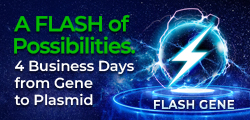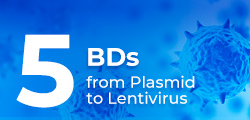-
REAGENT SERVICES
Hot!
-
Most Popular Services
-
Molecular Biology
-
Recombinant Antibody/Protein
-
Reagent Antibody
-
CRISPR Gene Editing
-
DNA Mutant Library
-
IVT RNA and LNP Formulations
-
Oligo Synthesis
-
Peptides
-
Cell Engineering
-
- Gene Synthesis FLASH Gene
- GenBrick™ Up to 200kb
- Gene Fragments Up to 3kb now
- Plasmid DNA Preparation Upgraded
- Cloning and Subcloning
- ORF cDNA Clones
- mRNA Plasmid Solutions New!
- Cell free mRNA Template New!
- AAV Plasmid Solutions New!
- Mutagenesis
- GenCircle™ Double-Stranded DNA New!
- GenSmart™ Online Tools
-
-
PRODUCTS
-
Most Popular Reagents
-
 Instruments
Instruments
-
Antibodies
-
ELISA Kits
-
Protein Electrophoresis and Blotting
-
Protein and Antibody Purification
-
Recombinant Proteins
-
Molecular Biology
-
Stable Cell Lines
-
Cell Isolation and Activation
-
 IVD Raw Materials
IVD Raw Materials
-
 Therapy Applications
Therapy Applications
-
Resources
-
- All Instruments
- Automated Protein and Antibody Purification SystemNew!
- Automated Plasmid MaxiprepHot!
- Automated Plasmid/Protein/Antibody Mini-scale Purification
- eBlot™ Protein Transfer System
- eStain™ Protein Staining System
- eZwest™ Lite Automated Western Blotting Device
- CytoSinct™ 1000 Cell Isolation Instrument
-
- Pharmacokinetics and Immunogenicity ELISA Kits
- Viral Titration QC ELISA Kits
- -- Lentivirus Titer p24 ELISA KitHot!
- -- MuLV Titer p30 ELISA KitNew!
- -- AAV2 and AAVX Titer Capsid ELISA Kits
- Residual Detection ELISA Kits
- -- T7 RNA Polymerase ELISA KitNew!
- -- BSA ELISA Kit, 2G
- -- Cas9 ELISA KitHot!
- -- Protein A ELISA KitHot!
- -- His tagged protein detection & purification
- dsRNA ELISA Kit
- Endonuclease ELISA Kit
- COVID-19 Detection cPass™ Technology Kits
-
- Automated Maxi-Plasmid PurificationHot!
- Automated Mini-Plasmid PurificationNew!
- PCR Reagents
- S.marcescens Nuclease Benz-Neburase™
- DNA Assembly GenBuilder™
- Cas9 / Cas12a / Cas13a Nucleases
- Base and Prime Editing Nucleases
- GMP Cas9 Nucleases
- CRISPR sgRNA Synthesis
- HDR Knock-in Template
- CRISPR Gene Editing Kits and Antibodies
-
![AmMag™ Quatro Automated Plasmid Purification]() AmMag™ Quatro automated plasmid purification
AmMag™ Quatro automated plasmid purification
-
![Anti-Camelid VHH]() MonoRab™ Anti-VHH Antibodies
MonoRab™ Anti-VHH Antibodies
-
![ELISA Kits]() ELISA Kits
ELISA Kits
-
![Precast Gels]() SurePAGE™ Precast Gels
SurePAGE™ Precast Gels
-
![Quatro ProAb Automated Protein and Antibody Purification System]() AmMag™ Quatro ProAb Automated Protein and Antibody Purification System
AmMag™ Quatro ProAb Automated Protein and Antibody Purification System
-
![Target Proteins]() Target Proteins
Target Proteins
-
![AmMag™ Quatro Automated Plasmid Purification]() AmMag™ Quatro automated plasmid purification
AmMag™ Quatro automated plasmid purification
-
![Stable Cell Lines]() Stable Cell Lines
Stable Cell Lines
-
![Cell Isolation and Activation]() Cell Isolation and Activation
Cell Isolation and Activation
-
 IVD Raw Materials
IVD Raw Materials
-
![Quick
Order]() Quick Order
Quick Order
-
![Quick
Order]() Quick Order
Quick Order
- APPLICATIONS
- RESOURCES
- ABOUT US
- SIGN IN My Account SIGN OUT
- REGISTER
Resources » Reference Databases » Citations Database
Services & ProductsNews & Blogs- Predicting Patient Outcome to Cancer Treatments Using Organoids
- New High-throughput Platform to Expedite Shared Neoantigen-Based Cancer Immunotherapies
- Nature always has a plan B
- Broad Institute Won CRISPR Patent Battle
- New Solutions Push the Limits of Engineered T Cells in Solid Tumors
- Real Life Mockingjays: How Songbirds Learn New Songs
- Suppression of skin-derived circulating factor improves the ability of aging skin to regenerate
- Unlocking the Potential of Cytokines for Cancer Immunotherapy
For each citation that was shared on social media (LinkedIn, Facebook, or Twitter) with the “@GenScript” tag, the author will be rewarded with a $10 Amazon gift card or 2,000 GS points.Human iPSC-Derived Down Syndrome Astrocytes Display Genome-Wide Perturbations in Gene Expression, an Altered Adhesion Profile, and Increased Cellular Dynamics
Hum Mol Genet. 2020;Bally BP, Farmer WT, Jones EV, Jessa S, Kacerovsky JB, Mayran A, Peng H, , Lefebvre JL, Drouin J, Hayer A, Ernst C, , Murai KK, .Products/Services Used Details Operation Proteins, Expression, Isolation and Analysis … passaged onto poly-D-lysine and matrigel coated plates in DMEM/F-12 medium supplemented with FBS (10%; Gibco), EGF (20ng/mL; Genscript) and FGF2 (20ng/mL; Cell Signaling) for 2 … (FGF2 (20ng/mL) and CNTF (5ng/mL; Genscript) (Protocol A), or cultured in DMEM/F-12 … Get A Quote Abstract
Down Syndrome (DS), caused by the triplication of human chromosome 21, leads to significant alterations in brain development and is a major genetic cause of intellectual disability. While much is known about changes to neurons in DS, the effects of trisomy 21 on non-neuronal cells such as astrocytes are poorly understood. Astrocytes are critical for brain development and function, and their alteration may contribute to DS pathophysiology. To better understand the impact of trisomy 21 on astrocytes, we performed RNA-sequencing on astrocytes from newly produced DS human induced pluripotent stem cells (hiPSCs). While chromosome 21 genes were upregulated in DS astrocytes, we found consistent up- and down-regulation... More
Down Syndrome (DS), caused by the triplication of human chromosome 21, leads to significant alterations in brain development and is a major genetic cause of intellectual disability. While much is known about changes to neurons in DS, the effects of trisomy 21 on non-neuronal cells such as astrocytes are poorly understood. Astrocytes are critical for brain development and function, and their alteration may contribute to DS pathophysiology. To better understand the impact of trisomy 21 on astrocytes, we performed RNA-sequencing on astrocytes from newly produced DS human induced pluripotent stem cells (hiPSCs). While chromosome 21 genes were upregulated in DS astrocytes, we found consistent up- and down-regulation of genes across the genome with a strong dysregulation of neurodevelopmental, cell adhesion, and extracellular matrix molecules. ATAC (Assay for Transposase-Accessible Chromatin)-seq also revealed a global alteration in chromatin state in DS astrocytes, showing modified chromatin accessibility at promoters of cell adhesion and extracellular matrix genes. Along with these transcriptomic and epigenomic changes, DS astrocytes displayed perturbations in cell size and cell spreading as well as modifications to cell-cell and cell-substrate recognition/adhesion, and increases in cellular motility and dynamics. Thus, triplication of chromosome 21 is associated with genome-wide transcriptional, epigenomic, and functional alterations in astrocytes that may contribute to altered brain development and function in DS.,© The Author(s) 2020. Published by Oxford University Press. All rights reserved. For Permissions, please email: journals.permissions@oup.com.Keywords

-




































